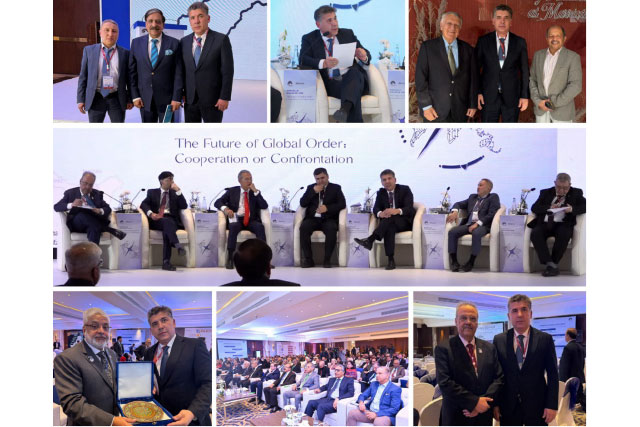
Akramjon Nematov: "Interregional connectivity is an important factor in stability and security in Central and South Asia."
Akramjon Nematov: "Interregional connectivity is an important factor in stability and security in Central and South Asia."
Tashkent, Uzbekistan (UzDaily.com) — On 11-12 November 2025, the sixth meeting of the Margalla Dialogue 2025, organized by the Islamabad Policy Research Institute, was held in Islamabad, Pakistan.
The event was attended by leaders of government and think tanks from Pakistan, the United States, China, Russia, the United Kingdom, Afghanistan, the EU, the Middle East, and Central Asia.
Among the distinguished guests were Pakistan’s Minister of Foreign Affairs Mohammad Ishaq Dar, Minister of Information and Broadcasting Attaullah Tarar, Minister of Justice Azam Nazeer Tarar, and Minister of Information Technology Shaza Fatima Khawaja.
The conference focused on maintaining strategic and economic stability, supporting regional security, and building connectivity.
Akramjon Nematov, First Deputy Director of the Institute for Strategic and Regional Studies under the President of the Republic of Uzbekistan (ISRS), presented a report on the importance of strengthening cooperation between Central and South Asia.
The expert noted that interregional connectivity is crucial for both economic development and maintaining security in the Eurasian macroregion.
According to him, there is currently a strong consensus in Central Asia on strengthening comprehensive ties with South Asia. This is confirmed by the special UN General Assembly resolution "Strengthening Connectivity between Central and South Asia," adopted in 2022 at the initiative of the President of Uzbekistan and supported by all countries in the region.
Akramjon Nematov emphasized that for Central Asia, connectivity is a matter of diversifying trade, transport, and logistics routes, which could provide a powerful boost to economic growth.
"South Asia, in turn, will gain access to the Central Asian market with its rapidly growing consumer demand. Moreover, our region can serve as a platform for accessing markets across Eurasia," said the First Deputy Director of the ISRS.
He drew attention to Central Asia’s demographic potential: its population grows by nearly 1.4 million people annually, and by 2050 it will exceed 100 million, making the region one of the "youngest" in the world, with an average age of 26.
The ISRS representative emphasized that, thanks to the good-neighborliness policy, Central Asia has become more consolidated. It is becoming a space for new opportunities and a center of economic attraction. Over the past eight years, the Central Asian economy has grown by 6% annually-twice the global average. Moreover, over the same period, trade with the outside world has increased two and a half times.
According to the expert, the new situation in Central Asia is creating favorable conditions for interregional cooperation and the implementation of large-scale transregional infrastructure projects. "Today, Central Asian countries are pursuing a policy of openness, restoring their historical role as a bridge between West and East, North and South. Moreover, Central Asia is becoming a promising growth area, strengthening the interconnectedness of all of Eurasia," he asserts.
Akramjon Nematov stated that Uzbekistan and Pakistan are leading the way in developing cooperation between Central and South Asia.
With the election of Shavkat Mirziyoyev as President of the Republic of Uzbekistan in 2017, relations between Tashkent and Islamabad have reached the level of a strategic partnership. A continuous and comprehensive political dialogue is underway. In total, nearly twenty high-level talks have been held over the past four years-twice as many as in the previous thirty years.
Trade is experiencing unprecedented growth: turnover has increased 11-fold since 2017, reaching over US$400 million. At the same time, the Pakistani business presence in Uzbekistan has grown sixfold, reaching approximately 200 enterprises.
It’s encouraging that people-to-people contacts are expanding: while in 2017, more than 20 Pakistanis were studying in Uzbekistan, today their number has reached 1,200.
"These figures continue to grow, shaping the future of bilateral cooperation. And this is not the limit; the potential is enormous. Uzbekistan is firmly committed to working with Pakistan and all partners to strengthen cooperation," concluded Akramjon Nematov.
In addition, as part of his participation in the Margalla Dialogue 2025, the First Deputy Director of the ISRS held a number of meetings with representatives of the Pakistani expert community.
In particular, talks were held with Majid Ehsan, President of the Majid Ehsan, President of the Islamabad Institute of Policy Studies; Amina Khan, Director of the Center for Afghanistan, Middle East, and African Studies at the Institute of Strategic Studies, Islamabad; and Mansoor Ahmed Khan, Professor at the University of Peshawar, among others.
Issues of further deepening Uzbek-Pakistani cooperation, including interaction through analytical structures, were discussed.